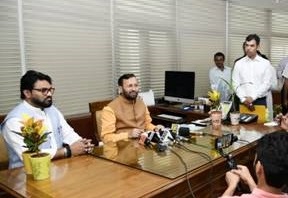
In Focus
Chandresh Dedhia
Head of Information Technology
Ascent Health
There is a strong emphasis on touchless behavior and hence on AI-based touchless technologies.
As the COVID-19 pandemic has persisted, businesses have responded with due precautionary measures, while making a swift transition from the traditional physical work environment to an virtual work ecosystem as much as possible. For a majority of enterprises, the remote-working model was implemented almost overnight and turned out to be a massive experiment during the first phase of lockdown.
In India, the work-from-home (WFH), was earlier mostly limited to privileged users. However, the pandemic introduced a significant and extraordinary change. Now, many companies have extended the complete WFH policy for their employees until June 2021. Today, all eyes are on the technology leaders who have assumed an enormous responsibility to devise and execute a differentiated tech strategy to embrace this new normal as part of a process.
In a recent interaction with Jatinder Singh of Better World, Chandresh Dedhia, Head of Information Technology, Ascent Health, outlines the top technology trends and challenges that the businesses are facing in the wake of COVID-19 pandemic. He also shares some of the best practices and technology implementations that could lead enterprises to deliver an exceptional customer experience with minimal disruption. Excerpts.
On the new normal and learnings
In today’s highly fluid situation, the business and IT landscapes are becoming more and more complex. Traditional models and architectures have lost their sheen. The longer the pandemic stays, the stronger the chances are that we will not go back to the pre-COVID normal. The last few months have helped us learn and unlearn many things, and these learnings will pave the way for the new model. Things have changed, people have transformed, and mindsets have changed. There is an indelible impact on almost everyone.
Moreover, because of the new operational dynamics, organizations have altered their policies. They are now focusing more on innovation and agility. Digital transformation is high on the agenda. The current crisis has given a growing sense of belief and visibility to enterprises on the best ways to tackle any future disruptions.
On technology trends and business order post COVID-19
I feel that there is a natural push towards the implementation of new-age technologies such as machine learning, artificial intelligence, business analytics, and robotic process automation (RPA). Until now, the adoption was happening at an unhurried pace. Now, digital transformation is no longer an option but a competitive advantage. The new normal is here to stay for a very long time, and no organization will like to be stuck because of its traditional ways of working. Enterprises have understood that they will need to explore ideas and means to ensure that the business continuity remains intact. Of course, given the fact that businesses have managed to stay afloat in the last four months, most of them are well equipped to plan their working models for the future.
There is a strong emphasis on contactless behavior, and this is likely to remain in place for an unspecified time. The pandemic has compelled us to keep focusing on social distancing, and hence enterprises will have stringent policies around contactless behaviors. Much focus will be on AI-based touchless and remote monitoring technologies implementation. So, the traditional model of working will be replaced by new working ways. Technologies like video and web-conferencing will continue to witness tremendous traction.
It is also expected that most of the organizations will invest a significant amount in multiple cloud environments to keep disruption at bay. The hybrid cloud model is likely to gain substantial traction businesses across sectors.
Going forward, companies will evaluate if they can save costs by reducing real-estate, and heavily relying on the new-age technologies for scaling-up. Technology is a great enabler, and ultimately all these benefits will be passed on to the employees. Organization can enhance the existing CCTV setups to accommodate social distancing, face masks, and hand gloves algorithms.
On balancing the short-term revenue requirements against long-term technology investment:
It is natural for any organization to rationalize its investments. We are no exception either. Every technology investment is being seen in the long-term horizon of, say, three to five years. Anything less than that is technically not a tech investment. For instance, there might be days when manufacturing costs may outweigh any tech-implementation decision. However, that doesn’t mean that the company won’t invest in the required technology. Yes, at times, you’ve to face such tests, but tech investments always have their significance, and decisions are taken based on the value that the technology provides. For instance, let’s say an organization needs to invest in a face-scanning or a retina-based attendance system. Probably before the pandemic, there was no urgency to implement this technology. But in the current environment, everyone understands the long-term benefits of such contactless technologies.
On challenges related to security threats
Remote working has become a new reality, and in a way, the new normal. The COVID-19 pandemic has created a concept of work from anywhere. Not just thousands but lakhs of people have shifted to WFH almost instantaneously. Hackers are always game to take advantage of such unparalleled situations. And for enterprises, it has become challenging to monitor and analyze the behaviors of employees who are accessing corporate data and networks remotely. Much focus will soon be on combining detection tools with machine-based cyber threat intelligence. Organizations will strengthen their capabilities to monitor behaviors and applications accessed by employees. Enterprises will continue to revisit their security policies and solutions to reduce risks to IT infrastructure. It is the need of the hour for businesses to consistently evaluate their readiness for supporting remote working as they scale up. There will be growing pressure on implementing a very sophisticated information security policy. Even SMEs will move away from free security tools and focus on robust and advanced information security solutions.
Chandresh is an IT business transformation leader with experience in digital, IT infrastructure, enterprise applications, information security, and IT governance and compliance. He has won numerous awards for his wide-ranging work in the domains of IT infrastructure and security.
An eloquent speaker and writer, Chandresh is also a marathon runner, environmentalist, and fundraiser. He has been associated with the Umeed Foundation for last three years and has raised more than Rs 6 lakh for education of needy children.
Expertise
- Warehouse management and automation
- Data virtualization on Denodo
- Robotic process automation (RPA)
- Software-defined WAN (SDWAN)
- Mobile application development (Low Code)
- Information security management
- Cloud-based services on Amazon AWS and Google GCP
- Enterprise applications and integrations
- ERP implementation and support
- B2B application support
- DevOps and data engineering
Education
- Global CIO Programme, Digital Innovation, Indian School of Business
- MBA in Business Management, Marketing and Related Services from ITM and Southern New Hampshire University






0 Comments